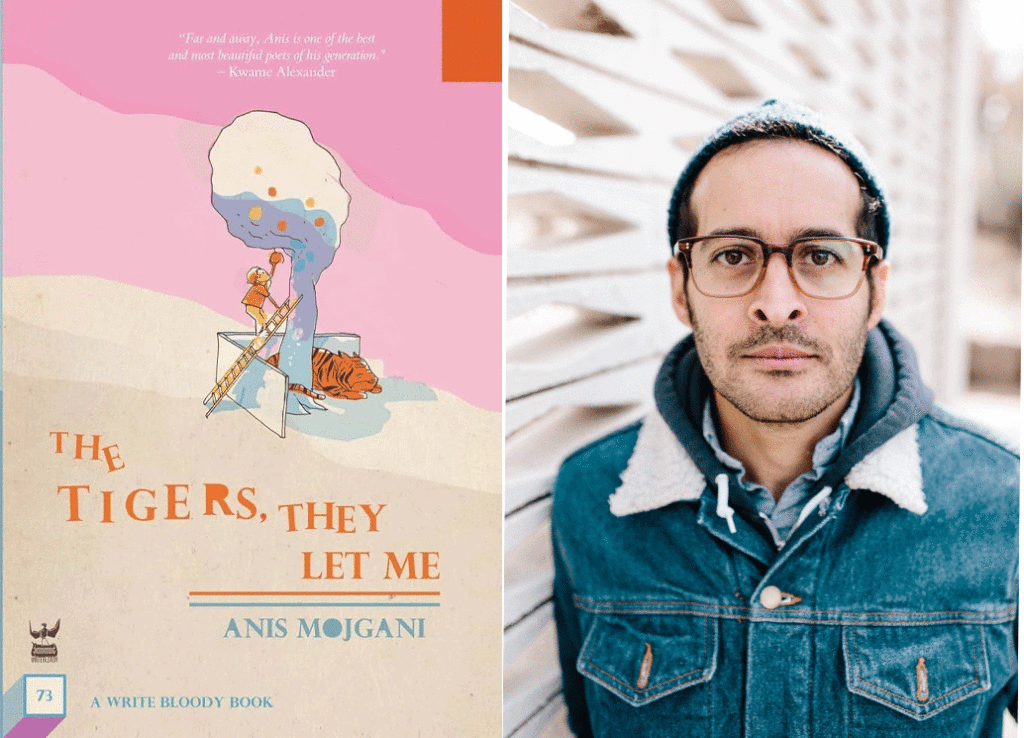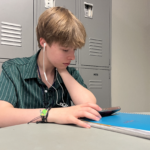Anis Mojgani’s latest book of poetry, The Tigers, They Let Me, is a rollercoaster of emotions as it explores the ups and downs of love and romance. Written during the Covid pandemic, The Tigers, They Let Me embraces sudden blooms of love and contends with the sense of loss that often leaves one fragile and searching. In this interview, we asked Mojgani about his journey becoming a writer and his love of the craft.
How and when did you get introduced to writing and poetry? What drew you to pursue it as a career?
I got introduced to writing it when I took a creative writing class my senior year of high school. I wasn’t really pursuing a career in it — I just knew I wanted to explore my relationship to writing and performing it, and so faced that direction and followed it. I knew of other poets who did it for a living and thought maybe at some point the way to do that would reveal itself if I just kept exploring my love for it and the craft of it. And then [I] found myself with opportunities to have it be my profession and so then followed that, and then the years stacked up and here we are, [with] it having been my career over the last 17 years or so.
What is your single most favorite thing about poetry?
I don’t have a single favorite thing about it. But I love that it is boundless, while also having its own science or logic or math or rules, within the world of what any given poem might be attempting to create. I love that it is an opportunity to observe, to listen better and to attempt beauty. [I love] that it allows me to possibly know better myself and to better understand others, [and] that it gives me a tool to use in the dark of myself that I can better know how to be with my emotions whether when in that darkness or in the light of the every day. I love that the poem exists with or without us. I love that it can say the things we don’t know how to say and that it can teach us how to say them ourselves. I love that it is utterly insignificant while also of the greatest importance. I love its ambiguity and that it holds space for the hands and hearts of many to be inside of the same space of one poem.
You’re known to be a “performance poet.” Could you describe what that means to you, and how your written work expresses itself on the page versus in speech?
For me, I don’t tend to use the term. I try not to even use the term performance when talking about what I do, though I also haven’t found the word to best describe it. I’m a poet, which means I write poetry and poems, and sometimes I say those poems aloud, and that’s where I want to stop with my descriptions for the most part. To me, a performance alludes something that is a falseness––a portrayal, a character, something put on top of another person to convey someone or something different than themself. And for me, when I perform my poems, I’m trying to do the opposite of performing them. I’m trying to be as open to myself and to others as possible, while also trying to give space for any parts of myself that don’t always get to be at the surface to come closer into the outside world.
What I ultimately want in speaking a poem aloud [is] to be in engagement with my vulnerability. So it’s actually the same thing as me writing work––an engagement with my vulnerability. It just takes shape differently, largely because it’s expression of this becomes firmly rooted in an audience and what is passing between me and other humans by way of the poem I’ve made.
You became Oregon’s Poet Laureate in 2020. What does that title mean to you? Do you have a sense of pride or achievement attached to it?
To me it means that I serve as a steward of poetry to and for the people of Oregon, and it also for me on a a more personal level, gives me a greater sense of acceptance by a place I am not from but that I call home, it’s a feeling of validation and a feeling of something larger than me claiming me as a part of it. So yes, there is a sense of pride and achievement for me in being attached to it.
Your book, The Tigers, They Let Me, is centered on the themes of love and relationships. Writing these poems during the height of the Covid pandemic, what made you choose this topic?
I don’t usually choose to write about anything. I write not because I know what to say but to learn what it is I want to say. And love is a thing that I was writing mostly on when inside of the pandemic. Over the past couple years it seemed to be mostly love poems and ones of revolution and social justice that I was writing. And in talking about this with a friend about how I wasn’t sure what a new book would be and what it would hold, and mentioning about how it was these two themes that were mostly surfacing in my writing, they said they thought a book of love poems right now to them felt really good. And I liked that and leaned into it.
One of the longest poems in the collection is “From, the Fish.” It’s an intricate piece, with a mix of prosaic structure, metaphor and poetic grace. Could you briefly describe your experience with longer form poetry, and why you choose it over short form for certain poems?
Thank you. I’m not really a writer who sits and says to myself “I’m going to write a poem right now” or “I’m going to now write a story” or “I’m going to write something that is five pages long or two paragraphs or three stanzas.” I sit and begin writing and from what reveals itself in that space I then begin spending with that writing and figuring out what it is and what it wants to say and how I can help with that.
So while there are choices being made by me, what the length of a piece is has less to do with me and more to do with what any given piece of writing is voicing [about] its own wants and needs. It has to do with what writing is asking of me to do with it, what it feels like a piece is seeking to do and how long of a path a piece is leading me on. I think a piece of writing is as long as it wants to be, mixed with a little bit of what is the length of time spent with it and the shape of that time.
What does your process of revision look like? Do you tend to draft quickly and revise later, or edit as you write? How long does the average poem take to write?
The thing I like about poems is that I usually get the whole thing out of me in a sitting––the heart of it, the mush of it. And so that part happens very quickly, and there is a fair amount of quick editing as it’s coming out, things speaking to me about its shape and its bones. But then I’ll step into the next step of better figuring out what the mush is wanting to say or what in me becomes excited by it and thus then what are the bones and body of it that best holds it up, and that revision process, that space of collaboration between me and whatever unseenness that has delivered the poem to me, can last anywhere from a week to years. And it’s not something that I am perhaps working on straight through to the finish, but I working and playing with, and then leaving it be and returning. And doing that until the conversation has quieted down or until it might be something to share with the world in some form or fashion.
Many poems from The Tigers, They Let Me share imagery, metaphors and ideas. How much did you intend for the book to be a cohesive whole rather than a collection of independent pieces?
It’s both. I tend to be less of a writer who may collect pieces that fit together and put them together and send it out, but one who really loves and wants for there to be a purpose and intent and journey or arch with what the collection as a whole is hoping to do. And it’s not necessarily a very specific thing that I always know I want for the reader to walk away with, nor a very detailed and specific story I wish to offer to them — I love that one thing can hold space for many truths and interpretations — but I don’t want the journey of the poems to be random and inconsequential either — they are very much in conversation with each other and I am seeking to make a singular object of its own, even while it’s made from other singular objects. I want the book to be both trees and a forest of trees.
What did the process of publishing look like for The Tigers, They Let Me?
I wanted to put out a new book, and my publisher was down with this. So I spent time reflected on my poems and my thoughts and what I wanted to do, and ideas came to the surface of what the book might be and contain, and then it became a back and forth in me between my ideas and my hopes and my written poems and my unwritten poems and my capabilities and my deadlines, and that arrived me at a manuscript eight to 12 months later later that I turned over to my publisher and we began the editing process that lasted a few months, and then the book came out in July of this past summer.
Do you have any advice for aspiring poets and authors?
Read, write and share. Don’t be afraid and don’t be ashamed. Trust yourself and follow your voice, while also trust[ing] others and what they offer. Be observing of others and the world. Listen to yourself and the world around you. Don’t always be writing — live a life that allows you to write from and to it. All writing is of importance whether it feels large or too small of a thing to write towards. Write to and of whatever might be asking for you to hold space for it.





Leave a Reply